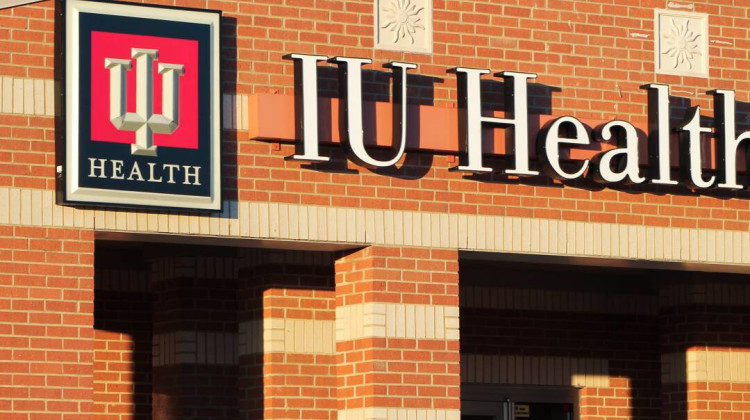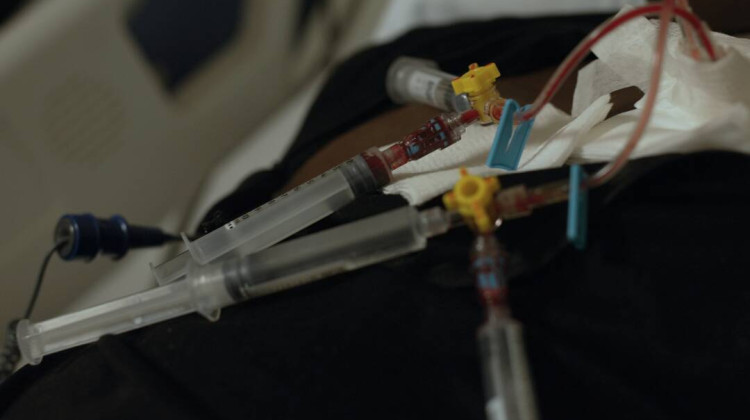
The hundreds of anti-LGBTQ+ and specifically anti-trans laws that have been filed since 2020 are an extension of the country’s ideological divisions, said University of Illinois-Springfield's Jason Pierceson.
Lauren Chapman / IPB NewsThe U.S. Supreme Court announced it would hear a challenge on a gender-affirming care ban for transgender youth in Tennessee. The ripple effects of that decision could determine the future of Indiana’s ban.
Tennessee’s ban is extremely similar to the one passed by Indiana lawmakers in 2023 — it bans medicinal and surgical gender-affirming care for transgender youth.
Gender-affirming care is health care that encompasses mental, social, medicinal and surgical care designed to treat gender dysphoria. Gender dysphoria is a clinically significant distress experienced by people whose gender assigned at birth and gender identity don’t match — though not all transgender people experience gender dysphoria.
Jason Pierceson is a political science professor at the University of Illinois-Springfield. He said the decision largely hinges on whether or not the justices buy the application of the 2020 U.S. Supreme Court ruling in Bostock v. Clayton County, Georgia. The court ruled that transgender and gay Americans were protected from employment discrimination “on the basis of sex.”
“For decades, the Supreme Court has held that sex-based discrimination brings with it heightened scrutiny — or a more searching analysis. And generally, laws examined under heightened scrutiny will not survive review,” Pierceson said.
Both the 6th Circuit Court of Appeals — which ruled on Tennessee’s ban — and the 7th Circuit — which struck down a temporary halt to Indiana’s — determined that the core of the lawsuits weren’t about gender identity, so they were decided by “rational basis.”
“States, like Indiana and others, have said well, we have an interest — in their view — protecting what they see as the health of youth. Although trans advocates and individuals would say otherwise,” Pierceson said. “And major medical organizations would say otherwise. So, the question is: Does the court buy that argument and under which level of review?”
Pierceson said there is a parental rights argument that also shows up in lawsuits against gender-affirming care bans.
“There is a due process argument that courts have used to say these bans are unconstitutional because they interfere with the parents of trans children and their rights to set the health care future of their children,” he said.
READ MORE: What is gender-affirming care?
Join the conversation and sign up for the Indiana Two-Way. Text "Indiana" to 765-275-1120. Your comments and questions in response to our weekly text help us find the answers you need on statewide issues and the election, including our project Civically, Indiana.
While the court has only changed slightly since the Bostock decision in 2020, Pierceson said the appeal from the American Civil Liberties Union and Biden administration is a gamble.
“They’re betting on the fact that those two Republican justices in Bostock–in the Bostock majority, will hold on [to] that general Bostock theory of sex discrimination and apply that,” Pierceson said.
The hundreds of anti-LGBTQ+ and specifically anti-trans laws that have been filed since 2020 are an extension of the country’s ideological divisions, Pierceson said.
“These bans are not, I think, required under any kind of policy logic. But they are driven by ideology and, I think, a certain desire to ban trans people from public life,” he said.
Pierceson said if the Supreme Court sides with Tennessee, it could have implications for transgender health care for adults.
“It would allow the government to come up with more reasons for banning health care in these contexts,” he said. “And it would be easier for them to do so without violating the Constitution if the Supreme Court rules that it’s neither sex-based discrimination nor gender identity-based discrimination.”
Pierceson said it’s a toss-up how the court will decide. And the November election could have a significant effect on that decision — especially if any justices step down.
The Supreme Court will hear arguments in the case later this fall and will likely have a decision in summer 2025.
Lauren is our digital editor. Contact her at lchapman@wfyi.org or follow her on Twitter at @laurenechapman_.
 DONATE
DONATE






 Support WFYI. We can't do it without you.
Support WFYI. We can't do it without you.